Overview
Navigating immigration processes in the U.S. can be overwhelming for healthcare workers. Have you ever felt lost in the immigration maze? The article "10 Essential Immigration Advice Tips for Healthcare Workers" addresses these real struggles, offering crucial guidance to help you find your way.
Understanding various visa options is vital. You deserve to know your rights and the resources available to you. Continuous education and community support can make a significant difference in your journey. We’re here to fight for you, ensuring you have the tools to succeed in your career and integrate smoothly into the healthcare field.
It’s important to remember: you’re not alone in this fight. We’ve handled these challenges before, and we’ll stand by your side every step of the way. Your future matters to us, and we’re committed to helping you navigate these complex processes with clarity and confidence.
Introduction
Navigating the complex world of immigration can feel overwhelming, especially for healthcare workers trying to build their careers in a new country. Have you ever felt lost in the immigration process? With countless visa options, rights, and cultural hurdles to navigate, the stakes are high for those dedicated to providing essential care while securing their legal status.
This article offers ten essential tips designed to empower healthcare professionals to manage their immigration journey effectively. You don’t just want to survive—you want to thrive in your role.
How can these insights transform your experience and help you overcome the challenges of immigration? We’re here to fight for you.
Vasquez Law Firm: Expert Immigration Legal Services for Healthcare Workers
Vasquez Law Firm is here to fight for you, focusing on immigration law and providing immigration advice for employees. We understand the real struggles you face—confusing immigration processes, denied workers’ comp claims, or sudden accidents, and we are here to provide immigration advice. With over 30 years of experience and a remarkable 98% success rate, we offer immigration advice that has successfully assisted thousands of clients in obtaining work visas, green cards, and citizenship.
Our bilingual team ensures clear communication, making the legal process accessible for Spanish-speaking clients. We know how overwhelming this feels, and we’re committed to being available 24/7 for emergencies. You deserve support during critical times, and we’re here to provide it. With a proven track record of over 30,000 successful cases, Vasquez Law Firm stands as your trusted advocate.
Let us guide you every step of the way. Your future matters to us, and we’re ready to fight for your rights. Yo Peleo — We Fight.
Explore Visa Options: Understanding H-1B and Other Work Visas
Healthcare professionals may find navigating visa options overwhelming without proper immigration advice. Have you ever felt lost in the immigration process? The H-1B visa allows you to work in specialty occupations, but that’s just one option. There’s also the J-1 visa for exchange visitors and the EB-3 visa for skilled personnel. Each of these visas comes with specific requirements, like educational qualifications and job offers from U.S. employers.
Understanding these choices is crucial for medical professionals who need immigration advice to build their careers in the U.S. medical system. You don’t have to face this alone—we’re here to offer you immigration advice and guide you every step of the way. Remember, your future matters to us, and we’re committed to fighting for your rights.
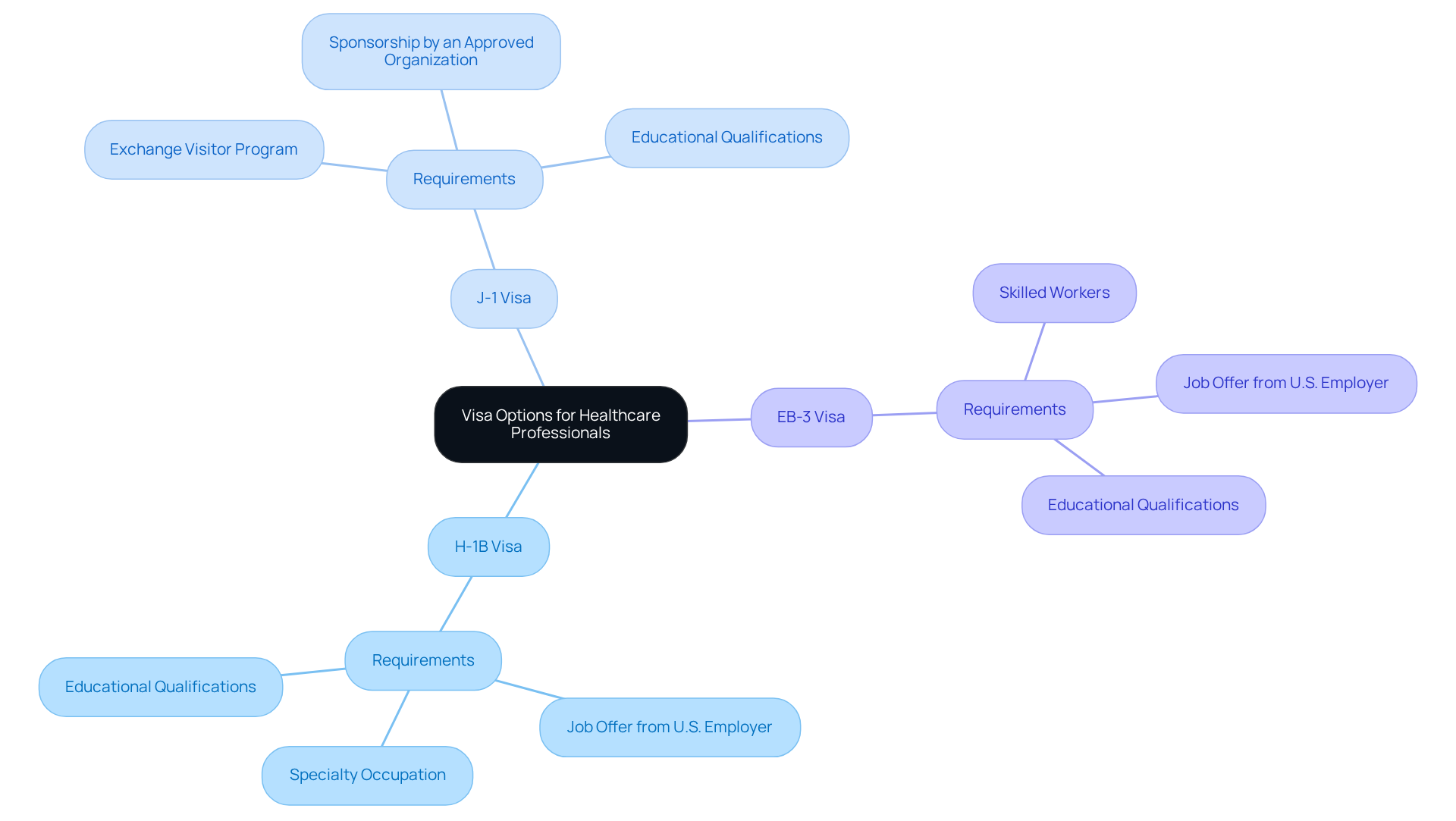
Know Your Rights: Protections for Immigrant Healthcare Workers
Immigrant medical professionals face real challenges, and it’s crucial to know your rights under U.S. law. You deserve fair treatment and protection from bias based on your immigration status. Remember, employers can’t ask about your immigration status unless it’s necessary for federal compliance. Understanding these rights is essential for ensuring a safe working environment.
Have you ever felt anxious about immigration enforcement actions, like a subpoena or ICE raids? It’s vital to know what you can do: you have the right to remain silent, the option to have an attorney, and the privilege not to sign documents without legal counsel. If ICE comes knocking, don’t open your door unless they have a warrant signed by a judge. In such moments, stay calm, exercise your right to remain silent, and request an attorney immediately. Reach out to Vasquez Law Firm for urgent legal help—your freedom may depend on swift action.
And if you experience a workplace accident, don’t brush it off. Seek medical attention, even if you feel fine. Document the incident and consult with a lawyer before talking to insurance representatives. These steps are crucial to protect your rights and ensure you have the legal support you need.
We’re here to fight for your family. Your future matters to us. Yo Peleo — We Fight.
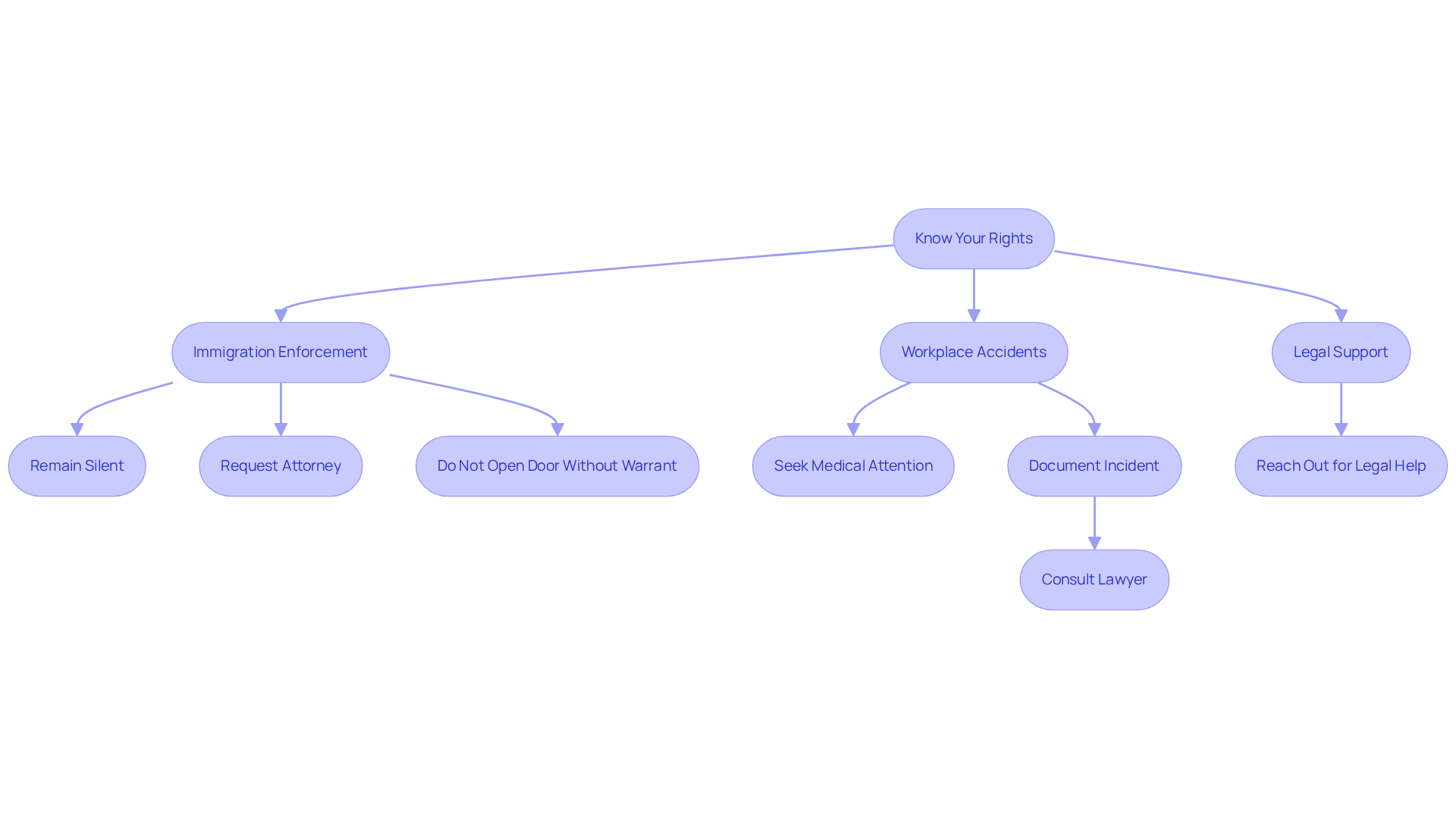
Enhance Cultural Competency: Providing Effective Care to Diverse Populations
Cultural proficiency is crucial for medical professionals who want to provide effective care to diverse communities. It’s about understanding and respecting cultural differences, which can deeply affect patient interactions and treatment outcomes. Training programs in cultural competency equip medical professionals with the skills to communicate effectively and build trust with patients from various backgrounds.
Have you ever felt that your unique needs weren’t understood in a healthcare setting? Initiatives like the Partners in Leprosy Action (PILA) show that community engagement and cultural competency can significantly improve access to care for marginalized populations. Research indicates that medical professionals who undergo cultural competency training report higher patient satisfaction and better health outcomes. They become more adept at addressing the specific needs of their patients.
For example, a social entrepreneurship program in the Philippines boosted facility-based deliveries from 20% to 90% through community co-creation. This highlights the power of culturally competent care. By prioritizing cultural competency, medical providers can ensure that every patient receives fair and effective treatment, ultimately enhancing health outcomes across communities.
As the Philippine Leprosy Mission states, "The development of partnerships and engagement with local stakeholders through workshops and training events have led to co-creation of solutions that have helped to strengthen the district-level health systems." We’re here to fight for your family’s right to quality care. Your health matters, and we’ll stand by you every step of the way.
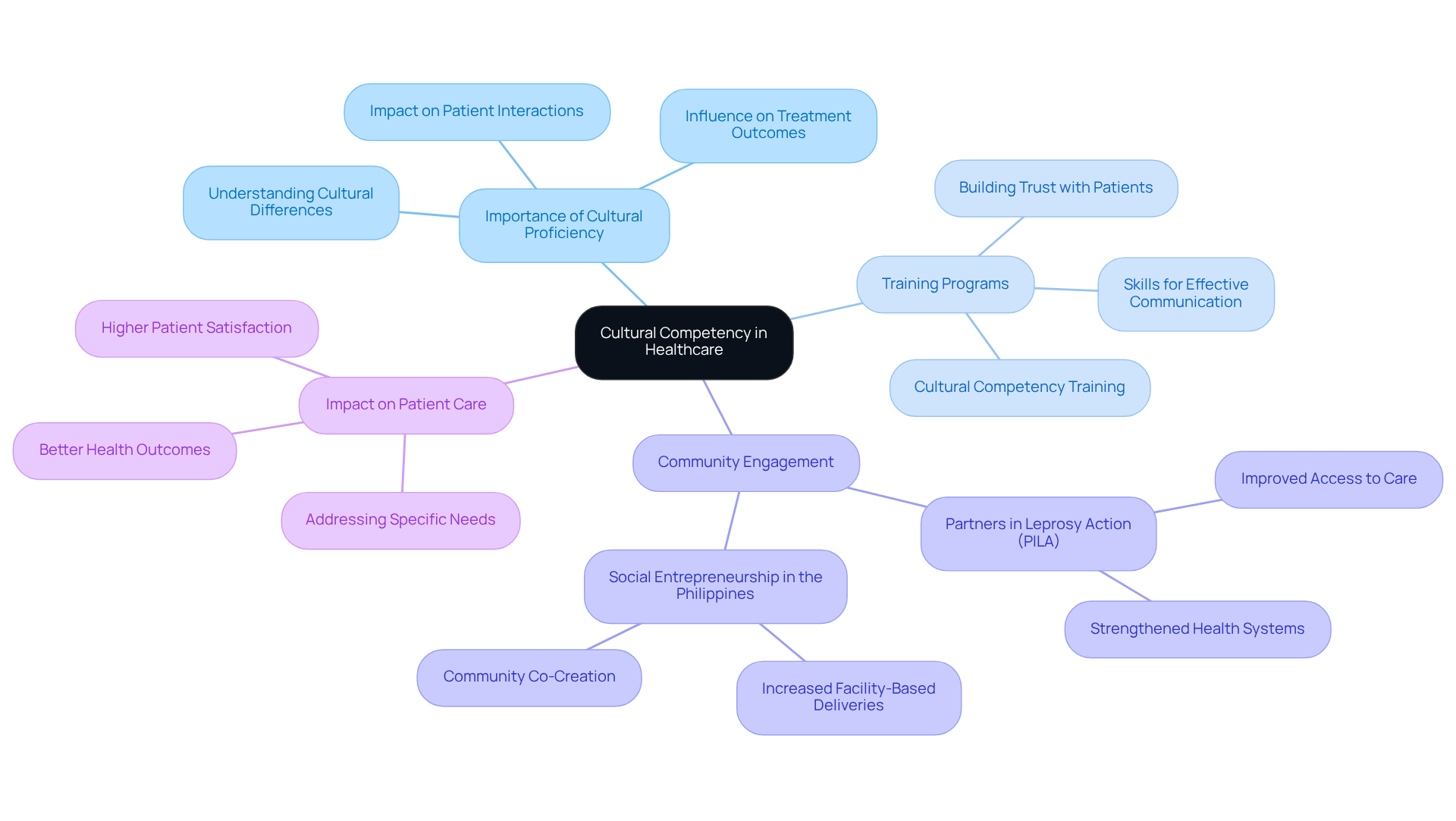
Ensure Language Access: Overcoming Barriers in Patient Communication
Language access is vital in healthcare. It ensures that every patient receives the care they deserve. Have you ever felt lost in a medical setting because of language barriers? It’s frustrating, but there’s a solution. Healthcare professionals should use professional interpreters and translation services to communicate effectively with patients who have limited English proficiency. This approach not only boosts patient satisfaction but also enhances the quality of care provided.
We understand how overwhelming this feels. You shouldn’t have to navigate these challenges alone. By ensuring clear communication, we can fight for your rights and well-being. Remember, you have the right to understand your care.
Let’s take action together. When healthcare providers prioritize language access, they empower patients to engage fully in their health journey. Your voice matters, and we’re here to support you every step of the way. Yo Peleo — We Fight.
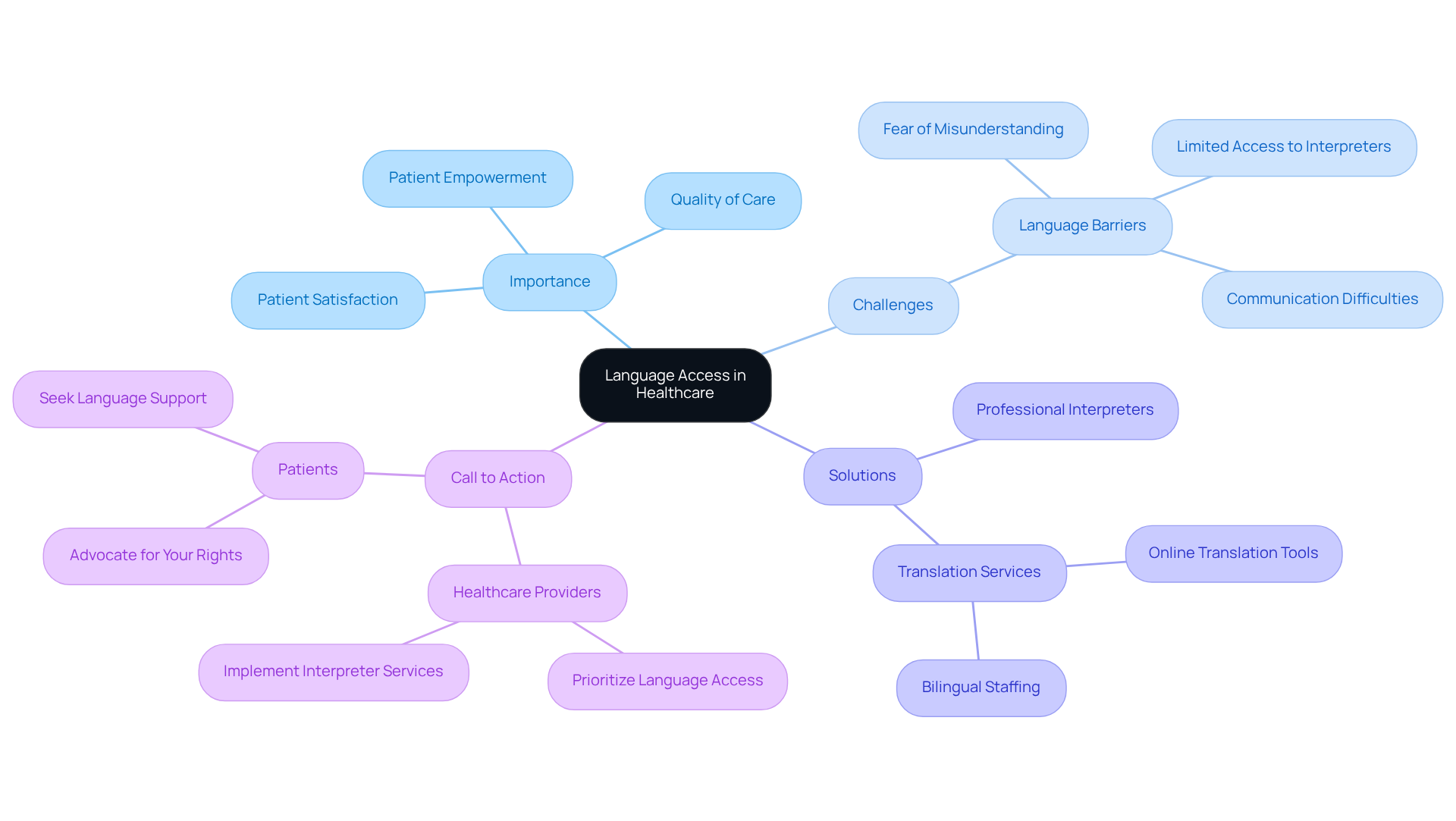
Leverage Community Resources: Collaborating with Local Organizations
Healthcare professionals can make a real difference by partnering with local organizations that support immigrant populations, like the Vasquez Law Firm. With over 30,000 successful cases and a remarkable 97% success rate, this firm provides tailored legal services for Hispanic immigrants, including immigration assistance and personal injury representation.
Have you ever felt overwhelmed by the immigration advice process? You’re not alone. These partnerships can open doors to vital services such as legal help, mental health support, educational resources, and immigration advice. By collaborating with community organizations, healthcare providers can enhance the care they offer, ensuring immigrant families receive the compassionate representation they truly deserve.
Remember, you have rights, and we’re here to fight for you. Your future matters to us, and together, we can navigate these challenges. Yo Peleo — We Fight.
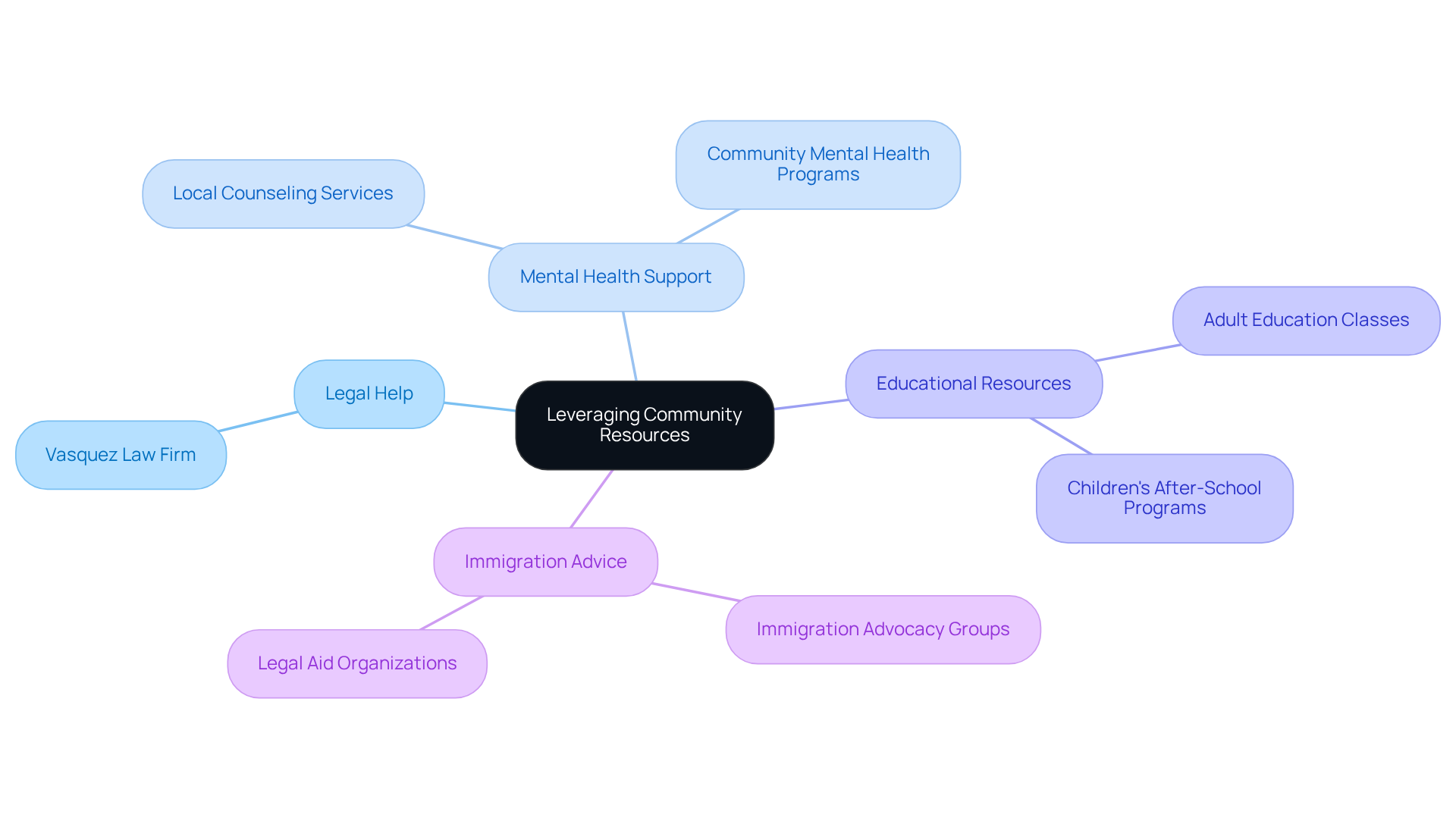
Stay Informed: Monitor Immigration Policy Changes Affecting Healthcare Workers
Healthcare professionals need to stay vigilant about immigration advice regarding policy changes that can significantly impact their employment and legal status. With nearly 2.8 million immigrants working in medical roles in the U.S. as of 2021, obtaining immigration advice is essential for understanding these policies, maintaining compliance, and securing job stability. Have you ever felt overwhelmed by the complexities of immigration law? Regularly reviewing updates from reliable sources, like government websites and legal organizations, is crucial for navigating these challenges and seeking immigration advice.
Statistics show that many medical workers, especially immigrants, may not be fully aware of recent policy shifts related to immigration advice. This highlights the importance of engaging proactively with credible information. It’s vital to know your rights, even if others tell you otherwise. By staying informed and seeking immigration advice, medical practitioners can effectively advocate for their rights and adapt to changing regulations, ensuring they remain indispensable to the healthcare system. Remember, you’re not alone in this fight—together, we can navigate these complexities.
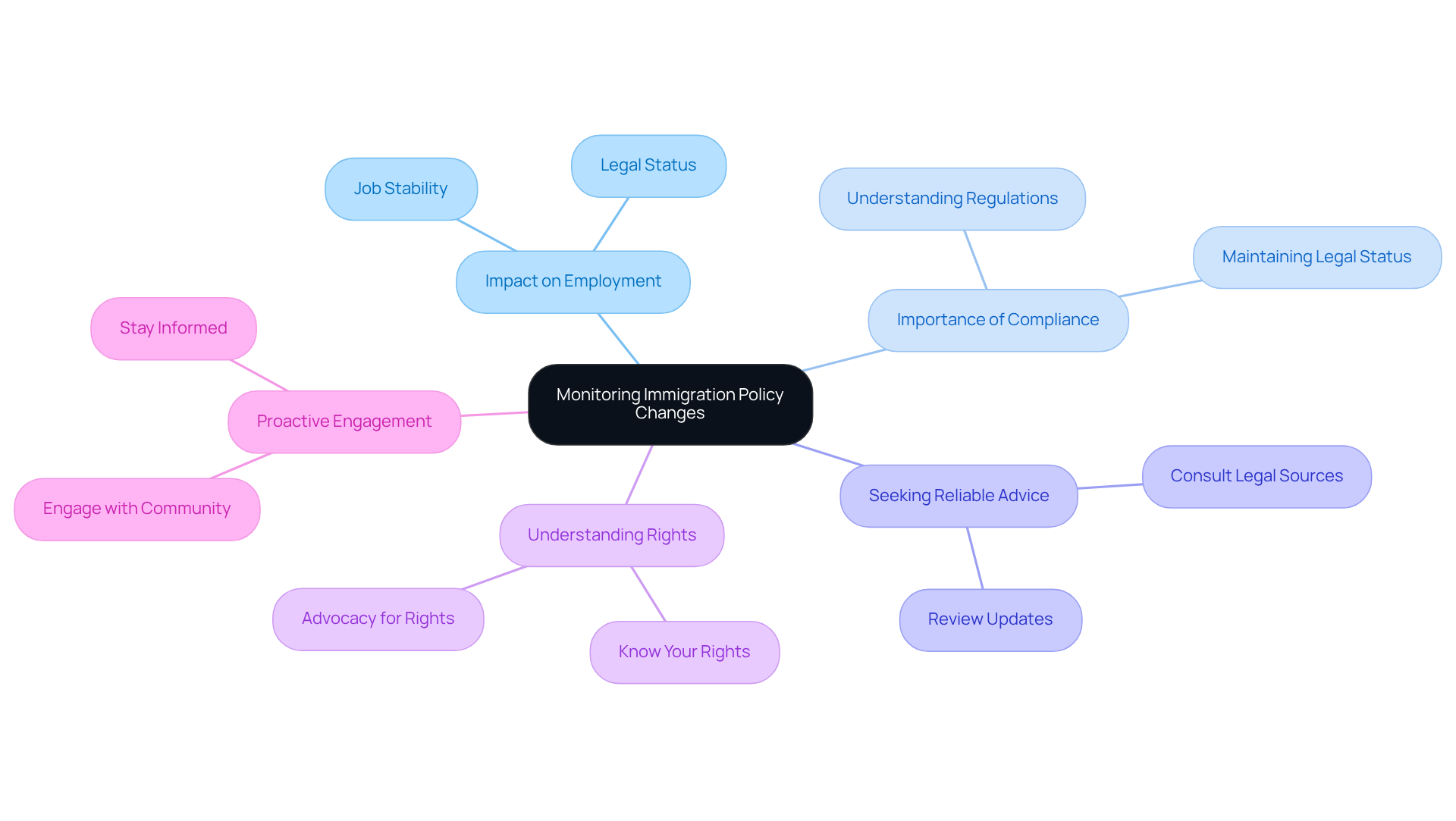
Prioritize Mental Health: Accessing Support for Stress and Burnout
Healthcare professionals often face significant stress and burnout, especially those who seek immigration advice while navigating the complexities. This is a real struggle that can deeply impact their well-being and job performance. Did you know that around 60% of medical professionals report experiencing burnout? Tackling this issue is essential.
To combat burnout, prioritizing mental health is key. Utilizing available support services, like counseling and peer support groups, can make a difference. Organizations have a vital role in creating a supportive atmosphere that encourages medical professionals to seek help when they need it. Implementing burnout prevention programs—such as resilience training and stress management workshops—equips staff with effective coping strategies.
Moreover, resources like telehealth services and immigration advice offer convenient access to mental health support, making it easier for medical professionals, particularly immigrants, to manage stress and maintain their well-being. By promoting mental wellness resources and fostering a culture of support, medical organizations can help alleviate burnout and enhance the overall well-being of their workforce.
Remember, there’s no shame in seeking help for your mental health. Take the first step today by exploring the resources and support systems available to you. We’re here to fight for your well-being.
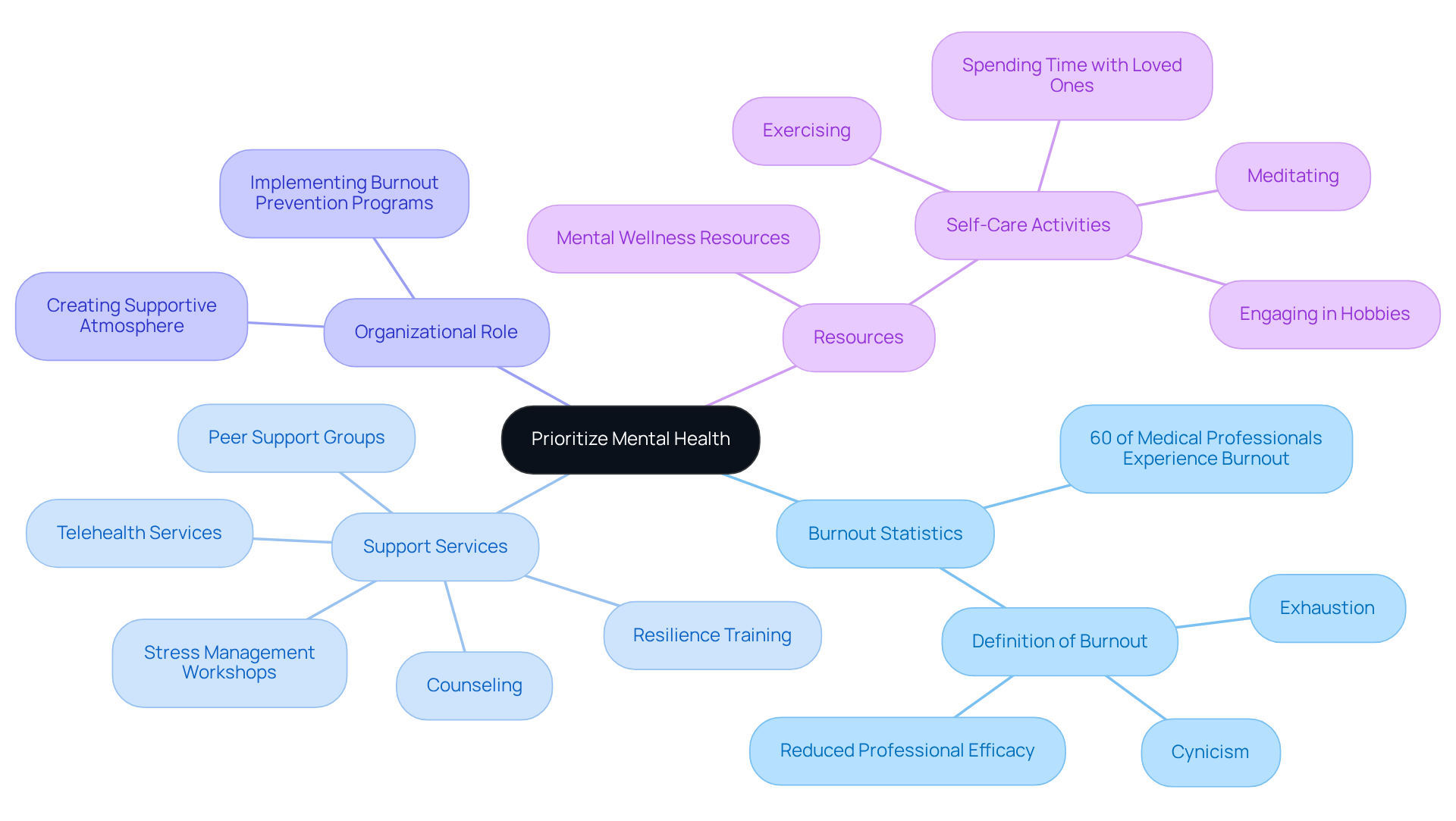
Build Your Network: Connecting with Other Healthcare Professionals
Networking is crucial for medical professionals looking to advance their careers. Have you ever felt overwhelmed by the need to connect with others in your field? Engaging with fellow medical staff allows for the exchange of insights, resources, and support.
Participating in industry conferences, joining associations, and leveraging social media platforms are effective ways to build a robust career network. Remember, you’re not alone in this journey—we’re here to help you navigate these connections.
Take action today: reach out, attend an event, or join a group. Your future matters, and every step you take strengthens your professional path. Yo Peleo — We Fight.
Pursue Continuous Education: Advancing Skills and Knowledge in Healthcare
Ongoing education is crucial for medical professionals. It helps them stay updated with the latest developments in medical knowledge and practices. Have you ever wondered how healthcare workers keep their skills sharp? By participating in professional development opportunities—like workshops, certifications, and online courses—they can enhance their abilities and provide the best care possible to their patients.
Lifelong learning isn’t just beneficial for personal growth; it’s essential for maintaining high standards in medical services. In 2025, we’re seeing a shift towards skills-centric training programs that not only highlight certifications but also improve recruitment efforts. This shift fosters employee engagement, which is vital in today’s healthcare landscape. For instance, a medical client faced challenges when trying to revise over 1,600 diverse job profiles. This situation underscores the need for ongoing education to address industry challenges effectively.
Tools like Lexonis software are being embraced to standardize job profiles and enhance skill mapping. This ensures that professionals are well-equipped to meet the evolving demands of the industry. As Mike Doss points out, realistic training scenarios that expose students to chaos are essential for building resilience and character under pressure. By engaging in these programs, medical professionals can significantly impact their performance and the quality of care they provide.
To truly maximize the benefits of professional development, healthcare workers should actively seek out training opportunities that align with their career goals and the needs of their patients. Remember, we’re in this fight together—your growth matters, and so does the care you provide.
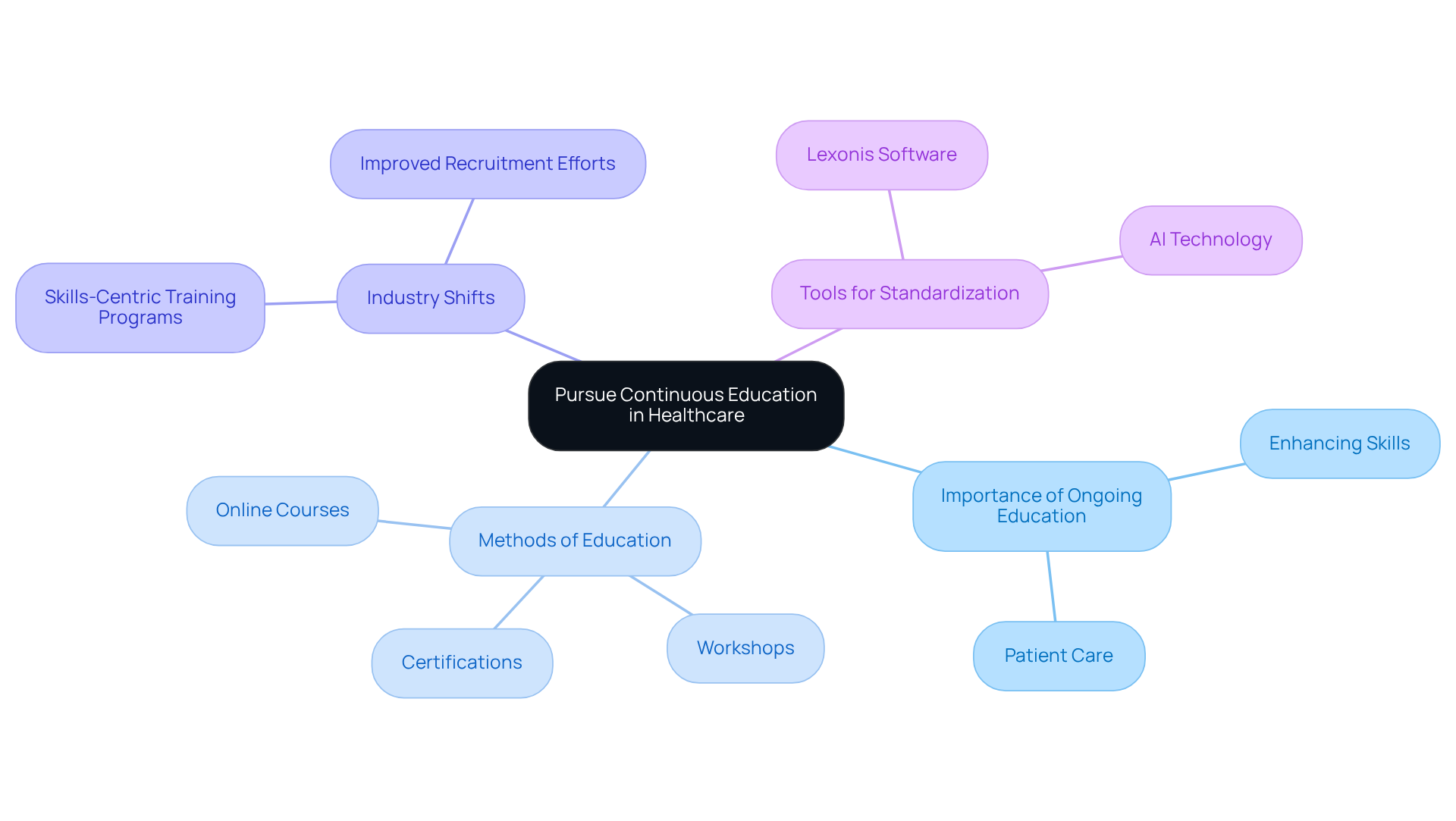
Conclusion
Navigating the complexities of immigration as a healthcare worker can feel overwhelming. But understanding essential immigration advice can empower you to thrive in your career. This article highlights the critical aspects of immigration processes, rights, and resources available to healthcare professionals, ensuring you’re well-equipped to overcome challenges and advocate for yourself.
Key insights discussed include:
- Various visa options
- The importance of knowing your rights
- The need for cultural competency in providing effective care
Other vital elements are:
- Language access
- Community collaboration
- Continuous education
By leveraging these elements, you can enhance your professional journey while delivering quality care to diverse patient populations.
Ultimately, the message is clear: you must remain informed and proactive in your immigration journey. Seek expert immigration advice, prioritize your mental health, and build robust networks. These steps will help you navigate challenges effectively and contribute meaningfully to the healthcare landscape. The fight for rights and support is ongoing, and every step you take toward understanding and advocacy strengthens the foundation for a successful career in healthcare.
Remember, we’re here to fight for your family. Your future matters to us. Yo Peleo — We Fight.
Frequently Asked Questions
What services does Vasquez Law Firm provide for healthcare workers?
Vasquez Law Firm specializes in immigration law and offers immigration advice to healthcare workers, helping them navigate confusing immigration processes, denied workers’ comp claims, and other legal challenges.
What is the success rate of Vasquez Law Firm?
The firm has a remarkable 98% success rate and has successfully assisted over 30,000 clients in obtaining work visas, green cards, and citizenship.
Is Vasquez Law Firm able to assist Spanish-speaking clients?
Yes, the firm has a bilingual team that ensures clear communication, making the legal process accessible for Spanish-speaking clients.
What types of work visas are available for healthcare professionals?
Healthcare professionals can consider several visa options, including the H-1B visa for specialty occupations, the J-1 visa for exchange visitors, and the EB-3 visa for skilled personnel, each with specific requirements.
What rights do immigrant healthcare workers have under U.S. law?
Immigrant healthcare workers have the right to fair treatment and protection from bias based on immigration status. Employers cannot ask about immigration status unless necessary for federal compliance.
What should I do if I encounter immigration enforcement actions, such as ICE raids?
If faced with immigration enforcement actions, you have the right to remain silent, request an attorney, and not sign documents without legal counsel. Do not open your door unless ICE has a warrant signed by a judge.
What steps should I take if I experience a workplace accident?
If you experience a workplace accident, seek medical attention regardless of how you feel, document the incident, and consult with a lawyer before speaking to insurance representatives to protect your rights.




